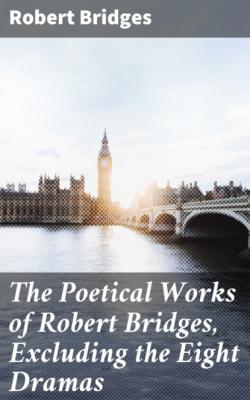The Poetical Works of Robert Bridges, Excluding the Eight Dramas. Bridges Robert
Читать онлайн.| Название | The Poetical Works of Robert Bridges, Excluding the Eight Dramas |
|---|---|
| Автор произведения | Bridges Robert |
| Жанр | Языкознание |
| Серия | |
| Издательство | Языкознание |
| Год выпуска | 0 |
| isbn | 4064066236861 |
Among our easeful gods hath facile time
A touch so keen, to wake such love of life
As stirs the frail and careful being, who here, 20
The king of sorrows, melancholy man,
Bows at his labour, but in heart erect
A god stands, nor for any gift of god
Would barter his immortal-hearted prime.
Could I but win this world from Zeus for mine,
With not a god to vex my happy rule,
I would inhabit here and leave high heaven:
So much I love it and its race of men,{4}
Even as he hates them, hates both them, and me
For loving what he hates, and would destroy me, 30
Outcast in the scorn of all his cringing crew,
For daring but to save what he would slay:
And me must first destroy. Thus he denieth
My heart's wish, thus my counsel sets at naught,
Which him saved once, when all at stake he stood
Uprisen in rebellion to overthrow
The elderseated Titans, for I that day
Gave him the counsels which his foes despised.
Unhappy they, who had still their blissful seats
Preserved and their Olympian majesty, 40
Had they been one with me. Alas, my kin!
But he, when he had taken the throne and chained
His foes in wasteful Tartarus, said no more
Where is Prometheus our wise counsellor?
What saith Prometheus? tell us, O Prometheus,
What Fate requires! but waxing confident
And wanton, as a youth first tasting power,
He wrecked the timeless monuments of heaven,
The witness of the wisdom of the gods,
And making all about him new, beyond 50
Determined to destroy the race of men,
And that create afresh or else have none.
Then his vain mind imagined a device,
And at his bidding all the opposèd winds
Blew, and the scattered clouds and furlèd snows,
From every part of heaven together flying,
He with brute hands in huge disorder heaped:
They with the winds' weight and his angry breath
Were thawed: in cataracts they fell, and earth
In darkness deep and whelmèd tempest lay, 60
Drowned 'neath the waters. Yet on the mountain-tops
Some few escaped, and some, thus warned by me,
Made shift to live in vessels which outrode
The season and the fury of the flood.{5}
And when his rain was spent and from clear skies
Zeus looking down upon the watery world,
Beheld these few, the remnant of mankind,
Who yet stood up and breathed; he next withdrew
The seeds of fire, that else had still lain hid
In withered branch and the blue flakes of flint 70
For man to exact and use, but these withdrawn,
Man with the brutes degraded would be man
No more; and so the tyrant was content.
But I, despised again, again upheld
The weak, and pitying them sent sweet Hope,
Bearer of dreams, enchantress fond and kind,
From heaven descending on the unhindered rays
Of every star, to cheer with visions fair
Their unamending pains. And now this day
Behold I come bearing the seal of all 80
Which Hope had promised: for within this reed
A prisoner I bring them stolen from heaven,
The flash of mastering fire, and it have borne
So swift to earth, that when yon noontide sun
Rose from the sea at morning I was by,
And unperceived of Hêlios plunged the point
I' the burning axle, and withdrew a tongue
Of breathing flame, which lives to leap on earth
For man the father of all fire to come.
And hither have I brought it even to Argos 90
Unto king Inachus, him having chosen
Above all mortals to receive my gift:
For he is hopeful, careful, wise, and brave.
He first, when first the floods left bare the land,
Grew warm with enterprise, and gathered men
Together, and disposed their various tasks
For common weal combined; for soon were seen
The long straight channels dwindling on the plain,
Which slow from stagnant pool and wide morass
The pestilent waters to the rivers bore: 100{6}
Then in the ruined dwellings and old tombs
He dug, unbedding from the wormèd ooze
Vessels and tools of trade and husbandry;
Wherewith, all seasonable works restored,
Oil made he and wine anew, and taught mankind
To live not brutally though without fire,
Tending their flocks and herds and weaving wool,
Living on fruit and milk and shepherds' fare,
Till time should bring back flame to smithy and hearth,
Or Zeus relent. Now at these gates I stand, 110
At this mid hour, when Inachus comes forth
To offer sacrifice unto his foe.
For never hath his faithful zeal forborne
To pay the power, though hard, that rules the world
The smokeless sacrifice; which first to-day
Shall smoke, and rise at heaven in flame to brave
The baffled god. See here a servant bears
For the cold altar ceremonial wood:
My shepherd's cloak will serve me for disguise.
SERVANT.
With much toil have I hewn these sapless logs. 120
Pr. But toil brings health, and health is happiness.
Serv. Here's one I know not—nay, how came he here
Unseen by me? I pray thee, stranger, tell me
What wouldst thou at the house of Inachus?
Pr. Intruders, friend, and travellers have glib tongues,
Silence will question such.
Serv. If 'tis a message,
To-day is not thy day—who sent thee hither?
Pr. The business of my leisure was well guessed:
